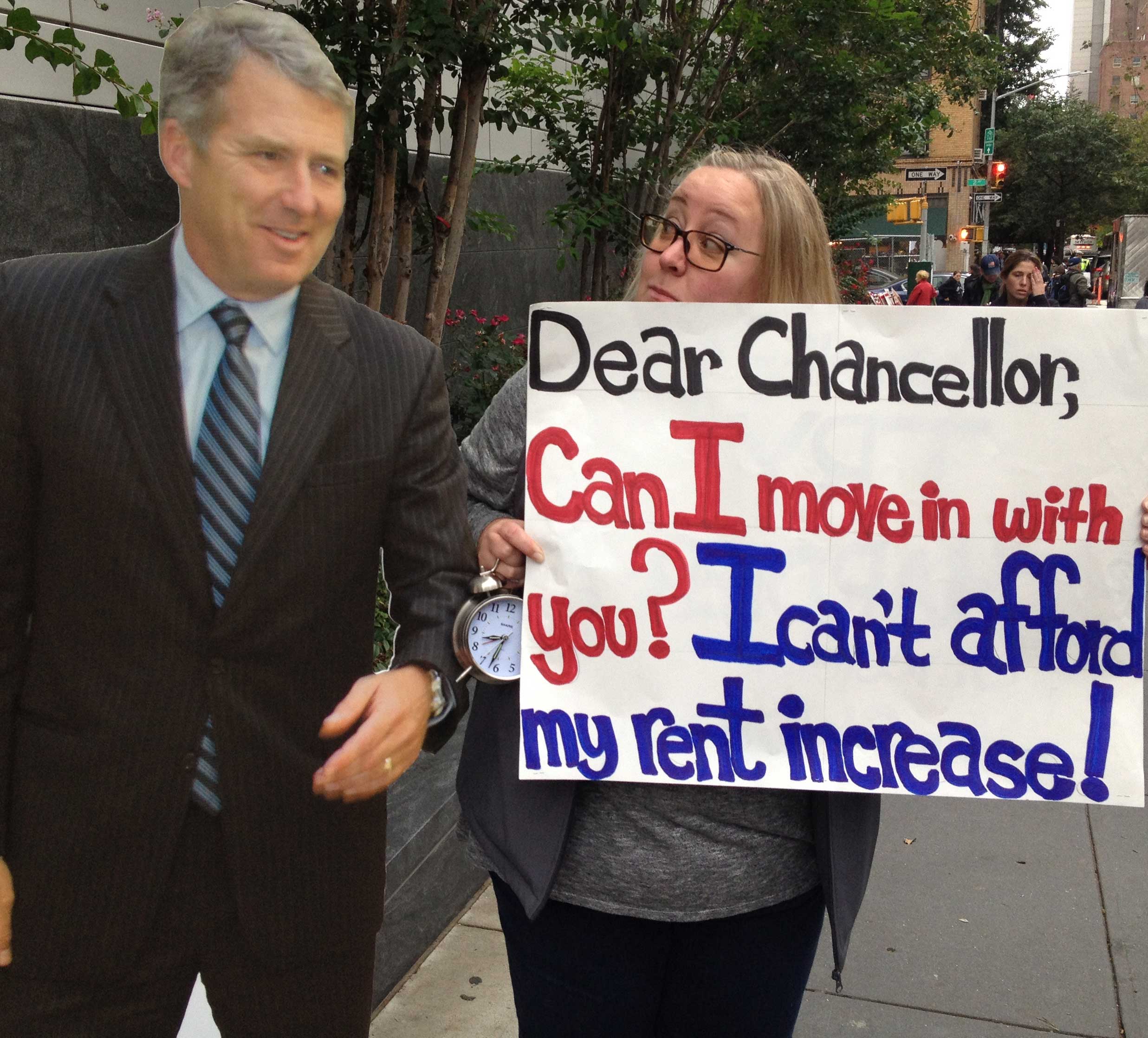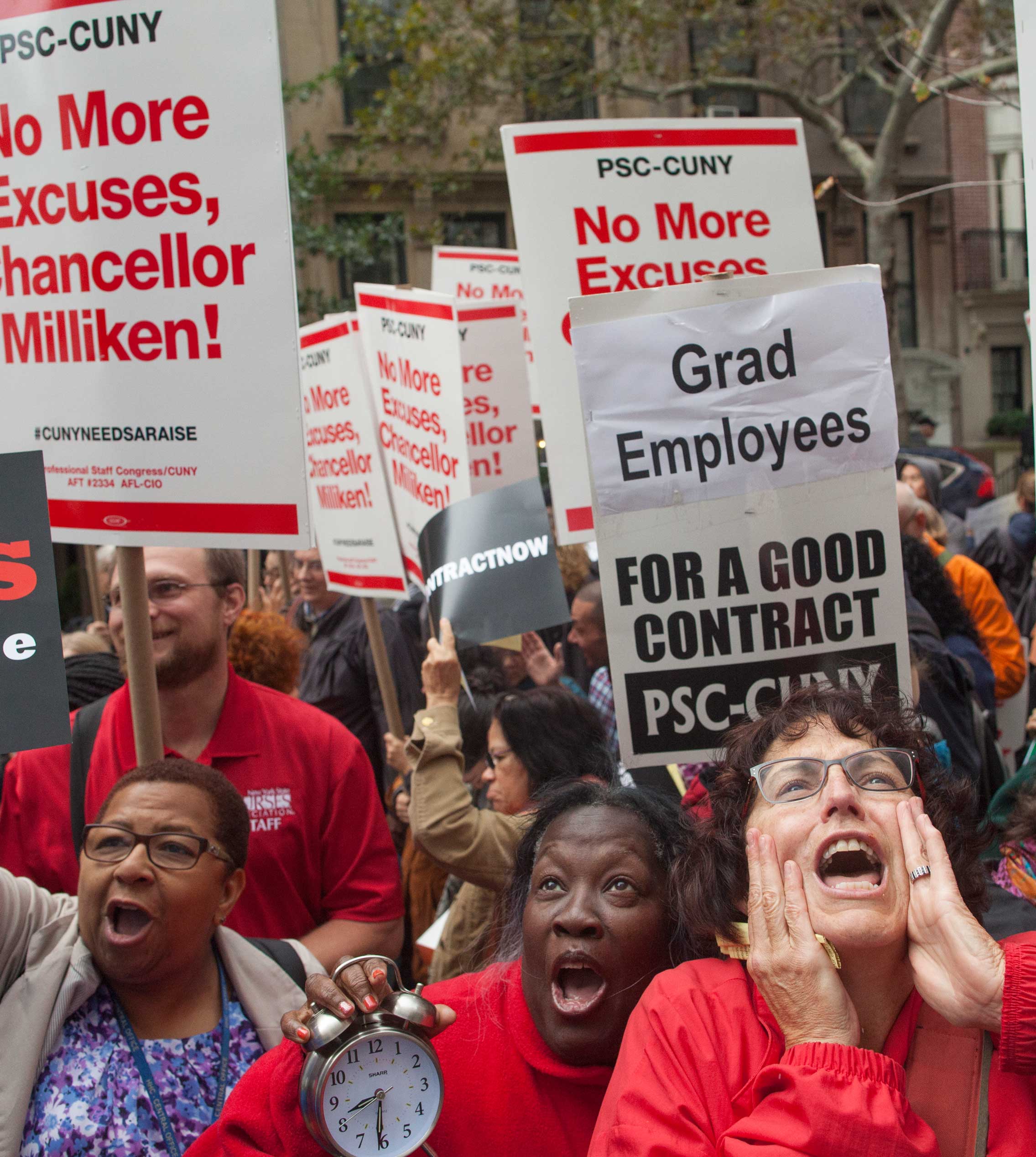Nearly 1,000 people turned out for a protest outside of Chancellor Milliken’s luxury apartment. The spirited crowd made it known that the Chancellor must do more in order to work toward a fair contract. See also: Keep Fighting For Your Contract * Members Take Action, Make Plans
PSC Demands Fair Contract
Chanting “CUNY needs a raise!” while hoisting ringing alarm clocks, a crowd of nearly 1,000, many wearing academic robes, flooded the street outside the Upper East Side luxury home of CUNY Chancellor James B. Milliken. The day of the protest, October 1, marked the date of a meeting of the CUNY Board of Trustees – the first of the 2015-2016 school year. Joining PSC-CUNY members at the union’s protest were unionists from a range of sectors and labor groups.
 |
Message to the Chancellor
It has been six years since CUNY employees received a raise, and increases in housing and transportation costs effectively mean CUNY faculty and staff earn less income than at the time of their last salary increase. Although Milliken has cited a contract settlement with the PSC as one of his highest priorities, he has yet to put an offer on the table, or to respond meaningfully to the economic proposal the PSC presented CUNY management in May.
Upper East Side Rally
“More than 80 percent of New York City’s unionized public workers have contracts, but CUNY employees don’t even have an offer on the table,” said PSC-CUNY President Barbara Bowen.
In addition to the 27,000 faculty and staff members represented by PSC, some 10,000 CUNY workers are represented by DC 37, an affiliate of the American Federation of State, County and Municipal Employees (AFSCME).
On East 68th Street the cool, early morning air carried the sound of alarm bells from protesters’ old-fashioned metal clocks. Many marchers expressed rage at the $19,500 per month paid by CUNY for the chancellor’s housing –in addition to his salary and other benefits. The clouds overhead did not dampen spirits; instead, protesters lined up to have their pictures taken with a life-size, cardboard cutout of the chancellor’s image as they held signs featuring messages for the chancellor.
“Dear Chancellor,” read the sign carried by Michele Doney, director of the Math and Science Research Center at John Jay, “Can I move in with you? I can’t afford my rent increase!”
Members spoke out about the economic toll being taken on their families and themselves due to the lack of a contract.
 |
“My daughter has to eat and go to school, just like his children do,” said Shirley Daniels, a nursing teacher at Medgar Evers College, of Milliken.
“I’m not eating as healthfully,” said Rohan Kennedy, a College Lab Technician who works at the Bronx Educational Opportunity Center. “In terms of living, I haven’t bought clothes in a while – we’re talking about years now. You have to eliminate a lot of things in order to make ends meet.”
For his part, Milliken reportedly told the CUNY trustees at their meeting that he had no hard feelings about the protest on his doorstep.
“I can assure you that when we say we are working on this every day to reach a successful resolution, I’m not exaggerating,” Milliken told CUNY trustees, according to Politico’s Conor Skelding. “And while I may not need a reminder or a wake-up call, I do not begrudge our faculty and staff for providing one.
“I talk to members of the faculty and staff every day, and I understand what they’re facing,” he said. “And I may not have created the circumstances that now resulted in a contract six years out of date. But I certainly accept the responsibility for ending what is an unacceptable situation.”
Increasing Inequality
“I don’t know if anyone whose salary is as high as Milliken’s can genuinely understand what an adjunct is facing when she teaches four classes a semester at CUNY and lives on $26,000 a year,” Bowen told Clarion. “This fight is about people’s real lives; CUNY management does not have the luxury of time to get a good offer on the table.”
Tanya Agathocleous, an associate professor of English at Hunter College, sees the PSC’s long fight for a contract as part of the battle against the widening gap of inequality throughout society. “The only way to address it is by continuing to provide services like public education,” she said. “That’s why I’m here.”
“This struggle is about the defunding of public education and the way in which people are just letting that happen,” Agathocleous continued. In addition to the lack of a contract, she cited the failure of the state to fund mandatory cost increases at CUNY colleges. (A bill that would require such funding starting in the 2016 fiscal year, and include collective bargaining costs, was passed by both chambers of the state legislature in June, but Governor Andrew Cuomo has yet to sign it.)
Union Solidarity
The spirited crowd included members of the NY Hotel Trades Council, the Laborers Construction & General Building International Union/Local 79, many locals of District Council 37 (DC 37/AFSCME), the Transport Workers Union (Local 100), the New York State Nurses Association, the Doctors Council, the Council of School Supervisors and Administrators, Utility Workers Union, the Civil Service Employees Association and the National Writers Union. Other labor groups, such as Fight for $15, also took part.
“The support from other labor unions was spectacular and moving,” Bowen said. “There were transit and hotel workers who had just come off night shifts and still wanted to protest with us. Labor turned out in force because working New Yorkers know what is at stake in our contract fight. CUNY is a lifeline for the working class and people of color; all working people are undermined when CUNY employees endure six years without a raise.”
While the trombones, trumpet and clarinet of the Rude Mechanical Orchestra provided a musical soundscape for chants (“Education is a right – fight, fight, fight!”) led by Bowen, Gustavo Mattza of the Hotel Trades Council explained why he joined the protest. An employee of the Hotel Pennsylvania, Mattza told Clarion that he earned his bachelor’s degree in economics at Baruch College. In addition, he said, “I have friends who are going to community colleges, and [who study at] Hunter College.” The lack of a contract for CUNY faculty and staff, he said, affects the students, as well. But the fundamental reason he was there with his HTC colleagues, he said, was “because we fight for workers’ rights.”
Liz Wilson of TWU Local 100, a 1986 graduate of Lehman College, agreed: “I know for a fact that [CUNY] teachers work very hard, and they need a contract.” One of her children graduated from City College, Wilson added.
“I’m old enough to have gone to a CUNY school when I paid no tuition,” Neal Frumkin, an officer in DC 37’s Retirees’ Association, told Clarion as he marched behind his union’s banner. “And that’s when New York City offered the opportunity for folks like me, whose parents didn’t go to college, to go to college.” (CUNY first began charging tuition in 1976.)
Committed to CUNY
 |
Amid the clamor of bells, chants and brass horns, Frederick Reese, a lecturer in the mathematics department at Borough of Manhattan Community College, carried a customized version of a union-issued sign that read “No More Excuses!” on which he had scribbled the symbol for the entity in calculus known as the indefinite integral. “We have been waiting for a new contract indefinitely,” he explained, before he ran off to teach his morning calculus class.
Lori Younge, an adjunct in the City Tech math department, said the lack of a contract made her situation even more precarious. Throughout the CUNY system, adjuncts are teaching a growing percentage of course offerings and shouldering huge workloads for low pay without real job security.
“I’m here to support myself and my coworkers,” Younge said. “You know, I was out sick last year with no aid, no work and no pay…. I lost my health insurance because there was a gap in my [employment]. All of these things made it difficult for me to live.”
HEO Nava Renek, program coordinator for the Brooklyn College Women’s Center, was inspired by the CUNY mission – educating people from the city’s otherwise underserved communities. “It is the only reason I’m here,” she said.
“Because this is meaningful work for us, we want to stay with CUNY,” Renek said, speaking for herself and her colleagues. “We don’t want to leave CUNY, but if we have no way to live in the city [because, with no contract, pay is going down in real dollars], people will have to make choices. And we don’t want to make those choices.”
A Changing Mood
“I know that it sounds [like a] cliché, but I don’t think I would be who I am now without the CUNY faculty I worked with,” said Amanda Ocasio, a graduate of Brooklyn College’s class of 2013. Throughout the protest, Ocasio tweeted up a storm.
Larry Goldbetter of the National Writers Union spoke for many labor supporters when he said, “It’s a big fight. This demonstration is changing the mood. This has been dragging five, six years. Now, it’s in the street. If the teachers get the support of the students, you get the support of the whole city. This is a breath of fresh air: the crowd, the energy, being out in the streets, fighting back.”

